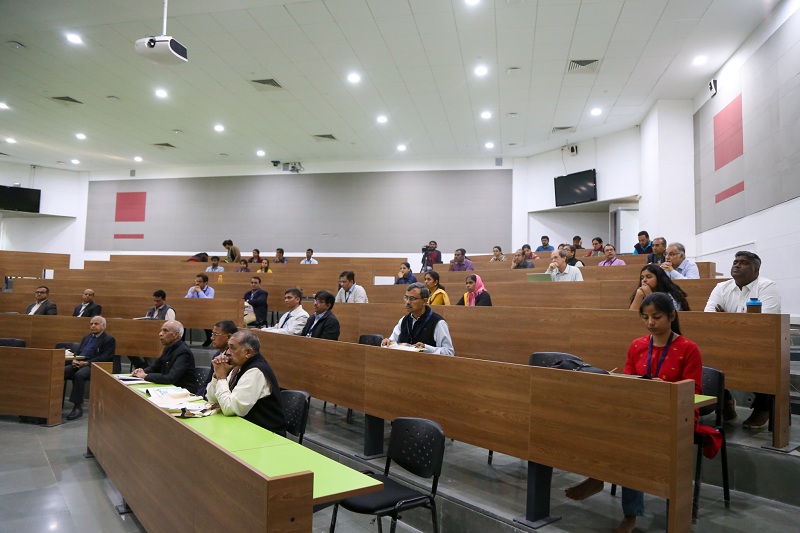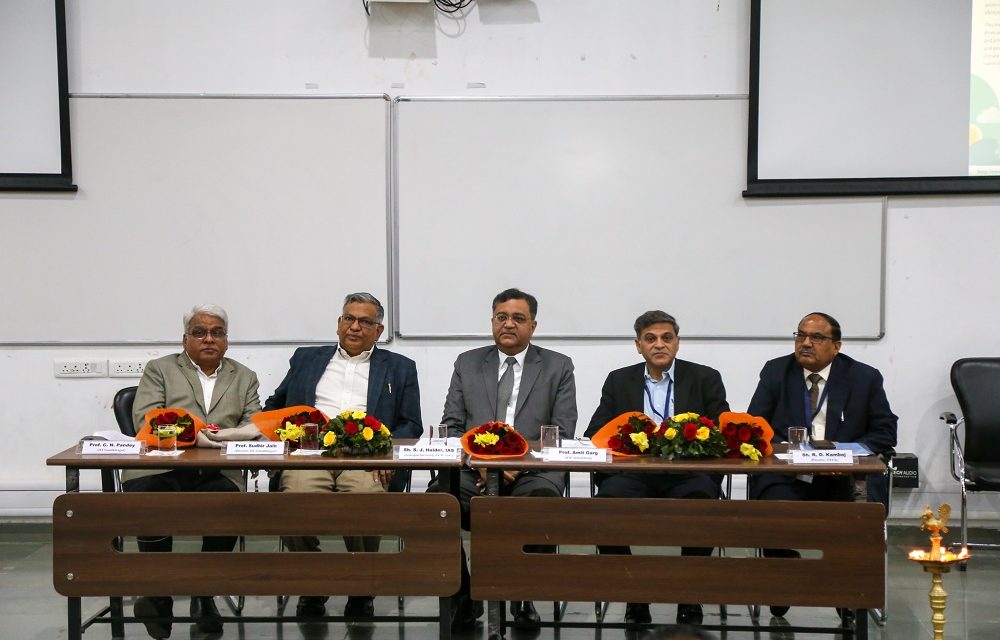A mega workshop series on Climate Change, Climate Action Now (CAN) 2020, was inaugurated today at the Indian Institute of Technology Gandhinagar (IITGN) by Shri S J Haider, IAS, Principal Secretary, Climate Change Department (CCD), Government of Gujarat, in presence of other distinguished guests, including Prof Sudhir Jain, Director, IITGN; Shri R D Kamboj, Director, GEER Foundation; Prof Amit Garg, Professor, Public Systems Group, IIM Ahmedabad; and Prof C N Pandey, IITGN.
Delivering his inaugural speech as the Chief Guest of the event, Shri S J Haider called for a collective action to mitigate climate change. He said, “The prospects of climate change are staring at us in our face and hence it is high time we understand the seriousness of this phenomenon. The concerns arising out of climate change cannot be addressed only by the government or the academia, but each and every member of the society, be it businessmen, industrialists, bureaucrats, or the homemakers, all of us have a role to play in our individual or collective capacity. Simple things like energy savings, water savings, liquid and solid waste management, rainwater harvesting etc. can help in reversing the effects of climate change.”
Further, he provided an overview of the initiatives taken by the state government, including the project in which the Climate Change Department has engaged with IITGN through the national mission on climate change, to work on climate risk assessment of several key and priority sectors of Gujarat. He said that the Gujarat state action plan on climate change, which incorporates nine thematic areas, is being revisited with additional targets and objectives to align with the national commitment for the United Nations Sustainable Development Goals 2030.
“We are ensuring that the carbon footprints should not increase while augmenting infrastructure and taking up activities on various fronts. Nothing should be at the expense of nature. Given the higher vulnerability of rural areas to the ill-effects of climate change, we are going to incorporate the ingredients of climate resilience under the Government of India’s Gram Panchayat District Plan (GPDP) for rural areas. We are sure that the deliberations that are going to take place in these workshops would lead us to some concrete findings and would help us pave a roadmap for the future”, he concluded.

One of the objectives, when we designed this campus, was to build a laboratory of a sort, where we try new things, learn from our mistakes and develop further. IITGN had successfully transplanted more than 70 trees on campus. The campus buildings have been designed in such a way that they provide a shield against summer heat, give passive cooling, and contribute towards energy savings. IITGN has also proactively taken up steps for rainwater harvesting, solid waste and liquid waste management. Climate change action is an extremely important agenda for the entire mankind. We believe that we have to do everything within our reasonable means even if somebody else is not doing it.
Prof Sudhir K JainWe all know that climate change is the reality and the brunt of it is seen every year. This is impacting our ecosystem and biodiversity, agricultural production, water security, natural resources, coastal infrastructure, as well as human health. The state government is working proactively to contribute towards climate-friendly development. GEER Foundation has taken up several studies in this direction and is also working on training and development with IITGN. We hope that these workshops will prove to be very useful for the target groups, collaborations and networking to take forward the climate action.
Shri R D KambojSharing his thoughts on the subject, Prof Amit Garg said, “While we are talking about action on climate change, we must ponder over two things – 1) Action for what; under which the first priority should be adaptation of all ecosystems at all levels, for water, forests, infrastructure, people, and vulnerable communities. And the best way for adaptation is sustainable development. 2) Action by whom; we have to understand that nobody will come to save us and so we have to do it ourselves by aligning our policies, actions, and day-to-day developmental goals to synchronise with it.”
The inaugural event was followed by the first workshop of the series that was divided into four different sessions. The first session on ‘Policy Picture on Climate Change – Global and National’ was chaired by Shri S J Haider, IAS, Principal Secretary, Climate Change Department, GoG. The main speakers were Prof Amit Garg, IIM-Ahmedabad; Dr Sweta Rajpurohit, GEER Foundation; and Mr Shwetal Shah, Climate Change Department, GoG. The second session on ‘Environment Governance’ was chaired by Prof Vimal Mishra, IITGN. The speakers were Prof Manish Kumar, IITGN; Dr G V Subrahmanyam, Member, EIA-EAC; Mr J S Kamyotra, Ex Member Secretary, CPCB; and Dr Sanjeev Tyagi, APCCF (R&T), GFD.
The third session on ‘Water Sector and Climate Change’ was chaired by Dr Dhimant Vyas, Chief Engineer (Panchayat) and Addl. Secretary, Water Resources Department, Government of Gujarat. The speakers during the session were Dr R C Jain, Advisor, GWRDC, GoG; Mr Sachin Oza, Former Executive director, DSC, Ahmedabad; and Dr Yogesh Jadeja, Head -ACT Bhuj. and the fourth and last session on ‘Agriculture and Climate Change’ was chaired by Shri Poonamchand Parmar, IAS, Addl. Chief Secretary, Agriculture Department, Government of Gujarat. The speakers during the session were Dr V K Agarwal, ADB; Prof Vimal Mishra, IITGN; Mr Shilp Verma, IWMI, Anand; and Mr R B Maravita, Executive Director, SSNL. Nearly 60 participants from various government departments attended the workshop.
This workshop series is jointly organised by IIT Gandhinagar and Gujarat Ecological Education and Research (GEER) Foundation, Gandhinagar, that will be conducted over a period of three months (February, March and April 2020), 15 workshop days, and on three theme-based segments namely, 1) Climate Change Policy and Governance (during February 2020), 2) Climate Action and Role of Industry (during March 2020), and 3) Climate Change Research And Technology Development (during April 2020).

